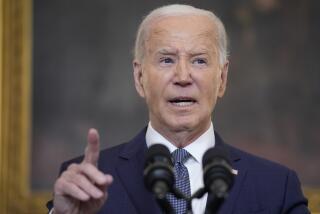Bush Seeking $3.12 Billion for Pakistan
WASHINGTON — President Bush said Tuesday that he will ask Congress for more than $3 billion in aid for Pakistan, a staunch ally in Washington’s war on terrorism.
Half the money is earmarked for military aid, but Bush said Pakistan would not be getting the F-16 fighter jets it has sought for 13 years. The rest of the aid package is intended to strengthen Pakistan’s infrastructure, health and education systems to try to address the poverty that the Bush administration now sees as one of the root causes of terrorism.
The invitation for Pakistani President Pervez Musharraf to visit Bush at Camp David, Md., was a reward for Pakistan’s help during and after the Afghanistan war. Bush praised Musharraf, a general who seized power in a 1999 coup, as “a courageous leader and a friend of the United States.” He lauded Musharraf’s commitment “to build a modern Pakistan that is tolerant and prosperous.”
Since Sept. 11, Bush added, Pakistan has apprehended more than 500 members of the Al Qaeda terrorist network and the Taliban.
“Slowly but surely, we’re dismantling the networks,” Bush said. “And we’ll continue on the hunt. It doesn’t matter how long it takes.”
Musharraf said the search for Osama bin Laden and other terrorists had prompted Pakistan to enter “treacherous” tribal areas along the Afghan border where no central government has ventured in more than a century.
“Now, whether Osama bin Laden is here or across the border, your guess, sir, is as good as mine,” Musharraf told reporters, adding that he was confident that the Pakistani military eventually would be able to find any Al Qaeda members hiding there.
Musharraf later told ABC’s “Nightline” that he would be willing in principle to provide 6,000 to 8,000 soldiers for peacekeeping duty in Iraq. Still to be worked out, Musharraf said, is how to pay for such a force.
He said he had not expected to get the F-16s, whose sale has long been blocked by Congress because of Pakistan’s development of nuclear weapons.
The U.S. has been anxious to avoid fueling the arms race between Pakistan and India. Washington recently allowed Israel to sell India new AWACS spy planes, but it has refused to let Israel sell India its Arrow antimissile system, which was jointly developed with the U.S. Pakistan opposes both sales.
A senior U.S. official said that the Bush administration was prepared to consider upgrades and repairs to Pakistan’s existing fleet of about 32 aging F-16s, but that Pakistan needed so much other military aid that the F-16 issue was not on the table.
The $3.12-billion aid package, spread over five years, dwarfs the $1 billion the U.S. gave Pakistan after Sept. 11. The U.S. official said the flow of aid will be contingent on Pakistan’s cooperation in three key areas: the war on terrorism, a commitment not to spread nuclear weapons capabilities to other nations -- including North Korea -- and progress toward democracy.
“Three years down the road, if things are going badly in [those areas], we’re not going to ask Congress for the money,” the official said.
Musharraf and Bush had a long discussion about education, particularly the need to reform Islamic schools that teach students the Koran but none of the skills needed in a modern economy, the official said. Musharraf told Bush that 1,200 such schools have already registered with the central government, giving Islamabad a start at providing funding to them and requiring them to teach a partly secular curriculum.
In 2002, the U.S. began a five-year, $100-million program to improve literacy, teacher training, and access to education for Pakistani girls. On Tuesday, the Bush administration announced an additional $120 million for development assistance, health, law enforcement and other programs, as part of the aid.
The aid package and the congenial reception from Bush will boost Musharraf’s standing with the Pakistani military, but could backfire with the largely anti-American public, said Pakistani security expert Syed Rifaat Hussain, a visiting professor at Stanford University’s Center for International Security and Cooperation.
Musharraf has united Pakistan’s ordinarily divided opposition by trying to push through broad constitutional changes without a debate in parliament, and by insisting that he retain his two jobs as president and commander in chief of the armed forces, Hussain said.
Musharraf’s argument is that internal and external security threats require him to hold both offices, but “people really do not buy into that argument,” Hussain said. “His ability to continue in the office and perform legitimately, I think, has been fundamentally eroded.”
Standing beside Bush, Musharraf described his nation as a “dysfunctional democracy,” adding, “what I am trying to do is introduce sustainable democracy in Pakistan.”
Musharraf has effectively turned his loyalty on the terrorism issue into a tool for extracting U.S. aid. During his visit, he will sign agreements on cooperation in science and technology and on trade and investment.
In addition, the Bush administration announced federal loan guarantees for $75 million in private sector lending to Pakistan.
Nevertheless, Stephen Cohen, a Pakistan expert at the Brookings Institution in Washington, said he was disappointed to hear that the package would be evenly divided between military and economic aid.
“This package should have been twice as large, with the additional money being for economics, education, building Pakistani communication and road and rail structure,” he said.
Pakistan desperately needs help to find a niche in the global economy, Cohen said. “There is no export that Pakistan has except for textiles and terrorists that has a global market.”
More to Read
Sign up for Essential California
The most important California stories and recommendations in your inbox every morning.
You may occasionally receive promotional content from the Los Angeles Times.










